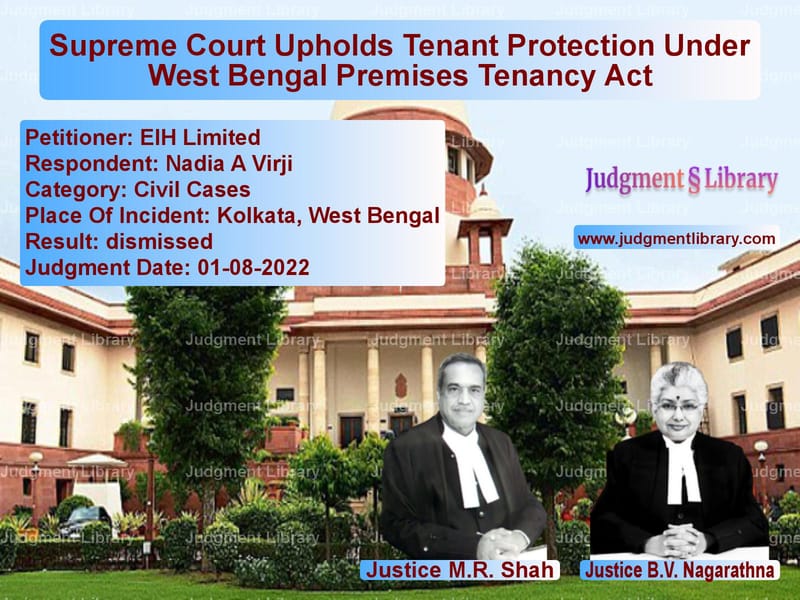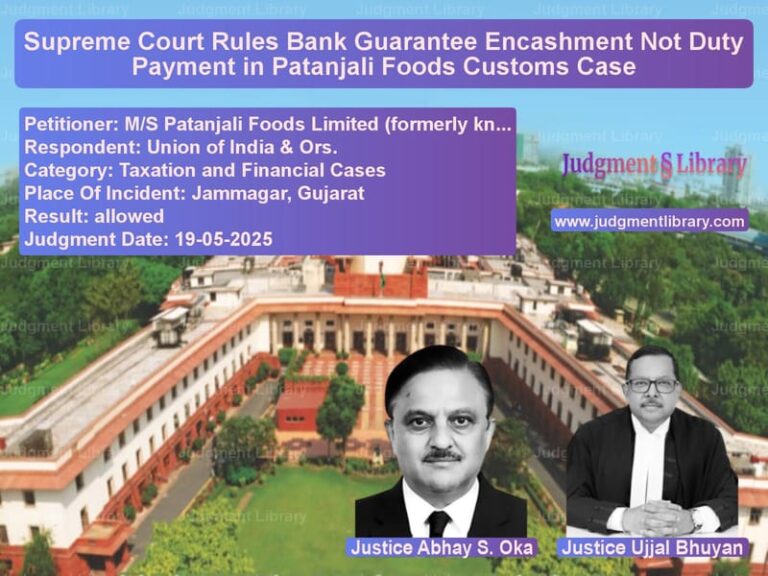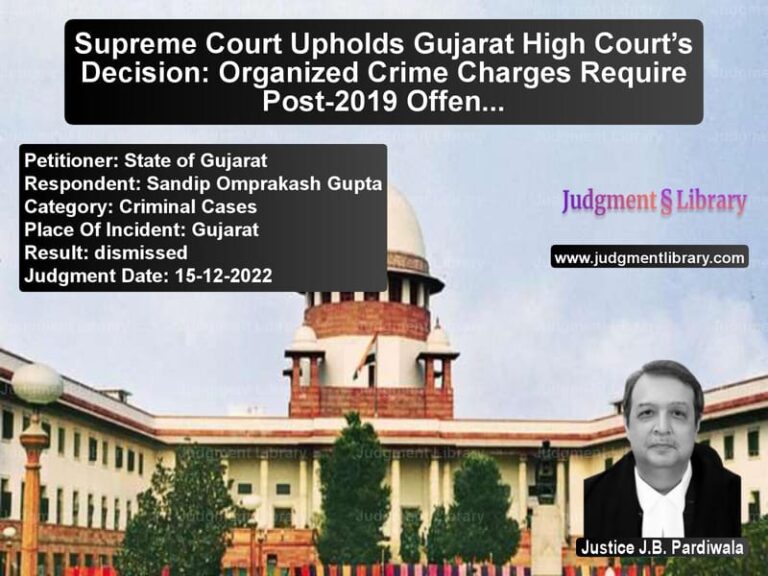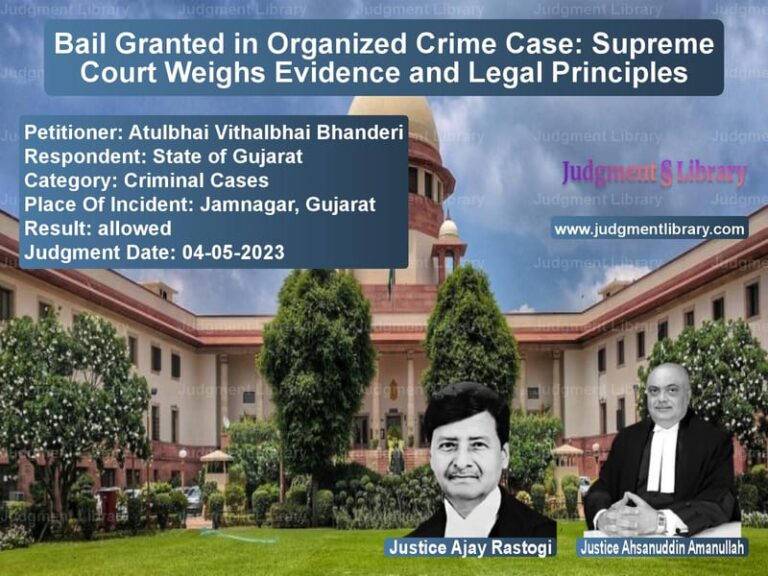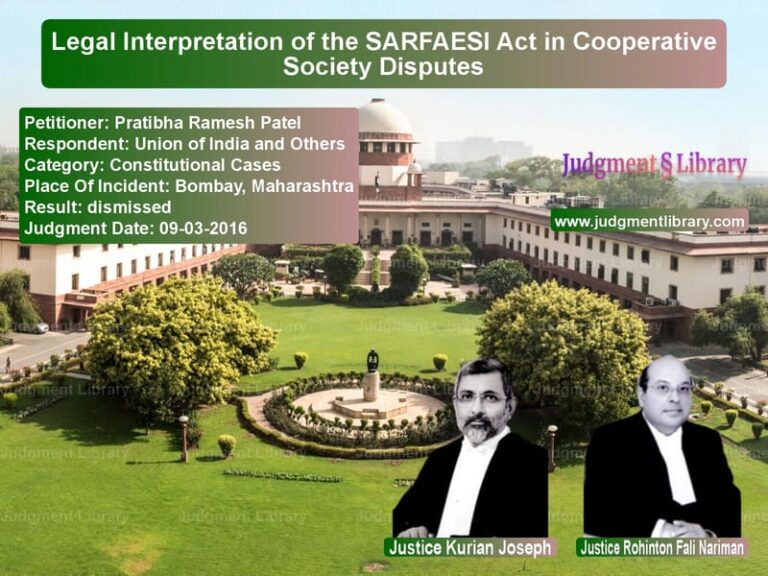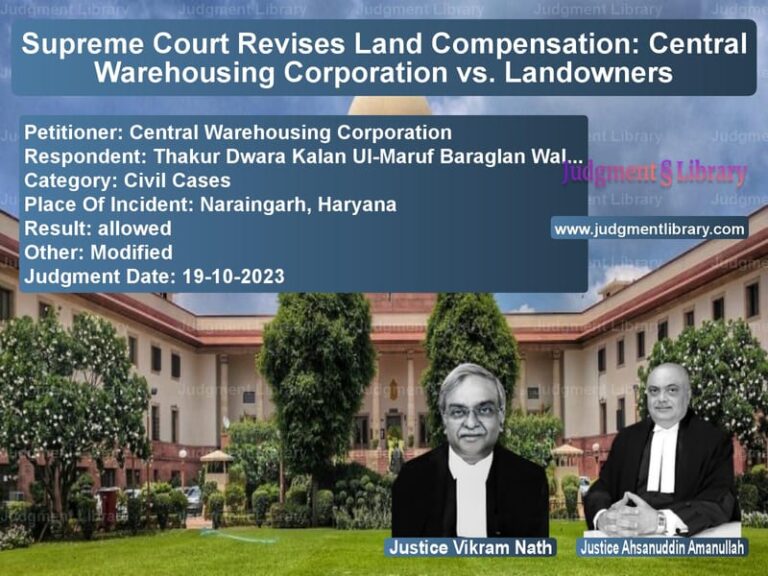Supreme Court Upholds Tenant Protection Under West Bengal Premises Tenancy Act
The Supreme Court recently ruled on a tenancy dispute between EIH Limited (landlord) and Nadia A Virji (tenant), confirming that the West Bengal Premises Tenancy Act, 1997 (WBPT Act) applied to the tenancy agreement and that the civil suit for eviction was barred under the Act. The judgment clarified key aspects of rent determination and the definition of ‘rent’ in relation to municipal tax obligations.
Background of the Case
The case involved a tenancy agreement executed in 1993 between EIH Limited (landlord) and Nadia A Virji (tenant) for a showroom located at the Oberoi Grand Arcade, Kolkata. The agreed rent was Rs. 10,000 per month, with the tenant also being responsible for paying municipal taxes.
In 2012, the landlord issued a notice under Section 106 of the Transfer of Property Act, 1882, terminating the tenancy and filed a civil suit for eviction before the Calcutta High Court. The landlord contended that the liability to pay municipal taxes increased the total rent beyond Rs. 10,000 per month, thus excluding the tenancy from the protection of the WBPT Act under Section 3(f).
The tenant challenged the maintainability of the suit, arguing that municipal taxes cannot be considered part of ‘rent’ under the Act. The Single Judge of the Calcutta High Court upheld the tenant’s objection and dismissed the suit under Order 7 Rule 11 CPC, ruling that the tenancy was protected under the WBPT Act. The Division Bench affirmed this decision, leading to the present appeal before the Supreme Court.
Arguments Before the Supreme Court
Petitioner’s Arguments (EIH Limited – Landlord)
- The landlord argued that municipal taxes paid by the tenant should be considered part of the ‘rent’ under Section 5(8) of the WBPT Act, thereby increasing the monthly rent beyond Rs. 10,000.
- They relied on the Supreme Court’s judgment in Calcutta Gujarati Education Society v. Calcutta Municipal Corporation, arguing that municipal tax liabilities are recoverable as arrears of rent and should thus be included in determining the total rent.
- The landlord contended that the High Court misinterpreted the Act and wrongly barred their eviction suit under the Transfer of Property Act.
Respondent’s Arguments (Nadia A Virji – Tenant)
- The tenant asserted that municipal taxes cannot be classified as ‘rent’ under the WBPT Act.
- They pointed out that the tenancy agreement explicitly mentioned a rent of Rs. 10,000 per month, with municipal taxes being a separate liability.
- They cited Section 230 of the Kolkata Municipal Corporation Act, 1980, which states that municipal taxes are an independent statutory obligation of tenants and are recoverable as arrears of rent, but do not become ‘rent’ themselves.
- They relied on the Supreme Court’s ruling in Popat & Kotecha Property v. Ashim Kumar Dey, arguing that unless the tenancy agreement explicitly includes taxes as part of rent, the same cannot be inferred.
Supreme Court’s Observations
The Supreme Court ruled in favor of the tenant and upheld the High Court’s dismissal of the eviction suit. The Court made the following key observations:
“The term ‘rent’ is not defined under the WBPT Act. However, reading Section 5(8) in conjunction with Section 230 of the Kolkata Municipal Corporation Act, 1980, municipal taxes cannot be considered a component of ‘rent’ unless explicitly agreed upon in the tenancy agreement.”
The Court further emphasized:
“Merely because municipal taxes can be recovered as arrears of rent under the municipal law does not mean they form part of rent under tenancy law. The landlord’s contention that rent includes tax is based on a misinterpretation of legal provisions.”
The Supreme Court also referred to the Calcutta Gujarati Education Society case, clarifying:
“That decision addressed the recovery mechanism of municipal taxes and did not redefine the meaning of ‘rent’ under tenancy laws. The High Court’s interpretation is correct.”
Supreme Court’s Verdict
The Supreme Court dismissed the landlord’s appeal and upheld the High Court’s ruling:
- The monthly rent remained Rs. 10,000 as per the tenancy agreement, keeping the tenancy under the protection of the WBPT Act.
- Municipal taxes were not part of ‘rent’ for the purpose of Section 3(f) of the WBPT Act.
- The civil suit under Section 106 of the Transfer of Property Act was barred, and the plaint was correctly rejected under Order 7 Rule 11 CPC.
Impact of the Judgment
This ruling has significant implications for tenancy laws in West Bengal:
- It reinforces tenant protection under the WBPT Act and prevents landlords from circumventing tenancy laws by artificially inflating rent calculations.
- It clarifies that statutory obligations like municipal taxes remain separate from rent unless explicitly agreed upon in the tenancy agreement.
- It provides legal certainty on the applicability of the WBPT Act, ensuring that tenants paying Rs. 10,000 or less remain protected from arbitrary evictions.
By reaffirming statutory tenant protections, the Supreme Court ensures that landlords cannot misuse municipal tax obligations to bypass rent control laws and evict tenants outside the framework of the WBPT Act.
Petitioner Name: EIH Limited.Respondent Name: Nadia A Virji.Judgment By: Justice M.R. Shah, Justice B.V. Nagarathna.Place Of Incident: Kolkata, West Bengal.Judgment Date: 01-08-2022.
Don’t miss out on the full details! Download the complete judgment in PDF format below and gain valuable insights instantly!
Download Judgment: eih-limited-vs-nadia-a-virji-supreme-court-of-india-judgment-dated-01-08-2022.pdf
Directly Download Judgment: Directly download this Judgment
See all petitions in Landlord-Tenant Disputes
See all petitions in Property Disputes
See all petitions in Judgment by Mukeshkumar Rasikbhai Shah
See all petitions in Judgment by B.V. Nagarathna
See all petitions in dismissed
See all petitions in supreme court of India judgments August 2022
See all petitions in 2022 judgments
See all posts in Civil Cases Category
See all allowed petitions in Civil Cases Category
See all Dismissed petitions in Civil Cases Category
See all partially allowed petitions in Civil Cases Category

